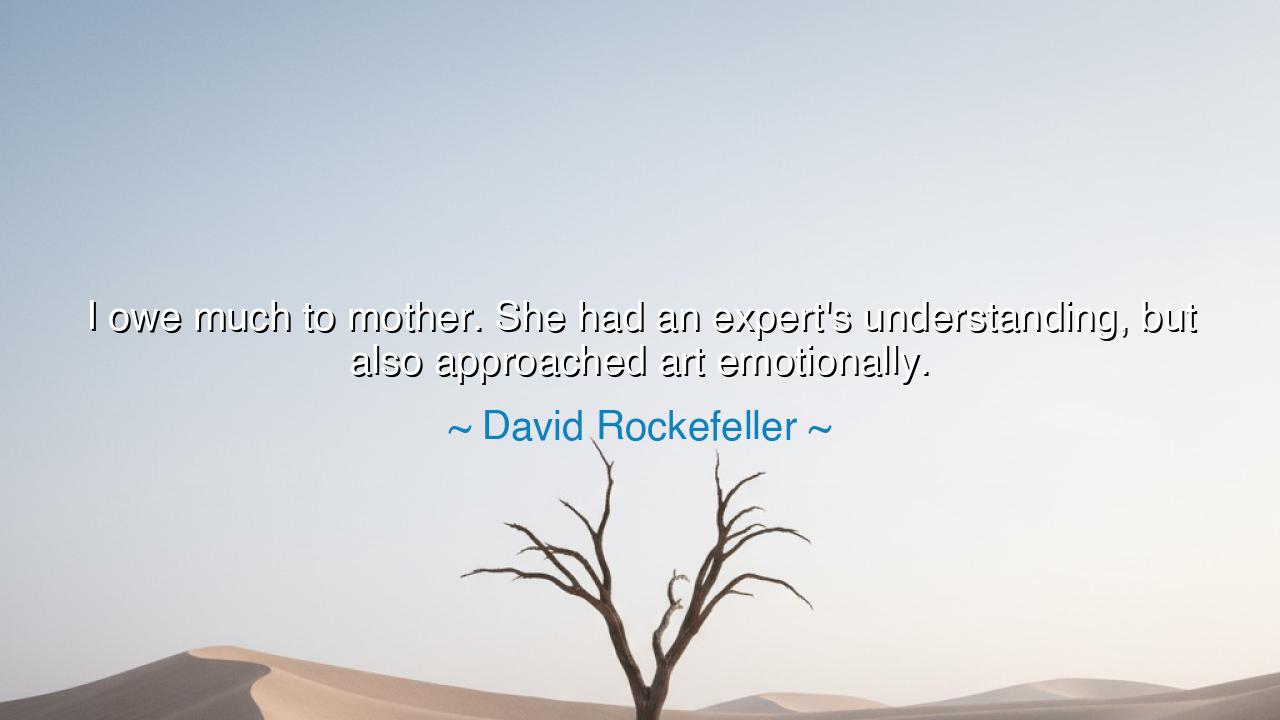
I owe much to mother. She had an expert's understanding, but also
I owe much to mother. She had an expert's understanding, but also approached art emotionally.






Hearken, O seekers of wisdom, to the words of David Rockefeller, heir of fortune and patron of art: “I owe much to mother. She had an expert’s understanding, but also approached art emotionally.” Beneath this quiet statement lies a truth as deep as the roots of civilization itself — that the highest form of understanding marries the intellect with the heart. For knowledge alone can dissect, but only feeling can give life meaning. Rockefeller’s tribute to his mother is not merely a son’s affection; it is an acknowledgment that mastery, whether in art or in life, is incomplete without emotional wisdom.
In the age of the ancients, it was said that reason and passion are the two wings of the soul. One lifts through thought, the other through empathy; only together can the spirit soar. Rockefeller’s mother, Abby Aldrich Rockefeller, was such a spirit — a woman whose cultivated mind and sensitive heart helped shape the modern appreciation of art in America. She was among the founders of the Museum of Modern Art in New York, an institution that bridged the cold intellect of analysis with the warmth of feeling. Her legacy embodies the essence of her son’s words: that true comprehension is not sterile logic, but the union of discernment and emotion.
To understand art merely as technique is to see its surface; to feel it deeply is to grasp its soul. The expert’s understanding studies composition, proportion, and form — but the emotional approach hears the silent cry within the brushstroke, senses the breath of the creator behind the canvas. Abby Rockefeller possessed both: she could recognize the genius of Picasso or Cézanne not because of prestige, but because her heart resonated with their vision. She taught her children that intellect must bow before wonder, that the mind must listen to the heart if it is to truly see.
History itself provides luminous parallels. Consider the Renaissance — when reason and passion danced in harmony. Leonardo da Vinci, scientist and artist alike, united knowledge with wonder. He dissected the human body to learn its mechanics, but painted its beauty as divine. His understanding was expert, yet his vision emotional. In every era, those who create and those who nurture creation must learn this dual wisdom: that intellect without emotion becomes cold precision, and emotion without intellect dissolves into chaos.
Rockefeller’s reflection also reveals something sacred about motherhood. The mother’s genius lies in her ability to blend instruction with tenderness, discipline with empathy. A mother may be learned, but her greatest lessons come not from teaching facts, but from embodying virtues. Abby Aldrich Rockefeller’s influence shaped her son not through lectures, but through the living example of balance — a balance between refinement and compassion, knowledge and intuition. In honoring her, David Rockefeller honors the eternal truth that mothers often pass on the soul’s education, not through words, but through presence.
The lesson here, luminous and enduring, is that wisdom requires harmony between mind and heart. In every pursuit — be it art, business, or the simple act of living — one must strive not only to understand, but to feel. The intellect illuminates paths; emotion fills them with meaning. The mother’s way, as Rockefeller describes, teaches that to appreciate beauty, one must first possess humility before it — to know enough to discern, yet to feel enough to be moved.
Practical guidance flows from this truth: when you study, let your knowledge breathe; when you judge, let compassion temper your thought; when you create, let intellect shape your form, but let emotion give it soul. Cultivate understanding, but never forget to feel. The mother’s wisdom endures in this — that the greatest comprehension of art, of life, and of love comes not from expertise alone, but from the courage to see with both mind and heart.
And so, let this teaching echo: true appreciation — whether of art, of people, or of life — is born from the marriage of intellect and emotion. The mother who masters both raises not only children but civilizations; the child who inherits such wisdom learns to see beauty not as possession, but as revelation. In this harmony lies the essence of all great creation — the music of the soul that reason alone could never compose.






AAdministratorAdministrator
Welcome, honored guests. Please leave a comment, we will respond soon